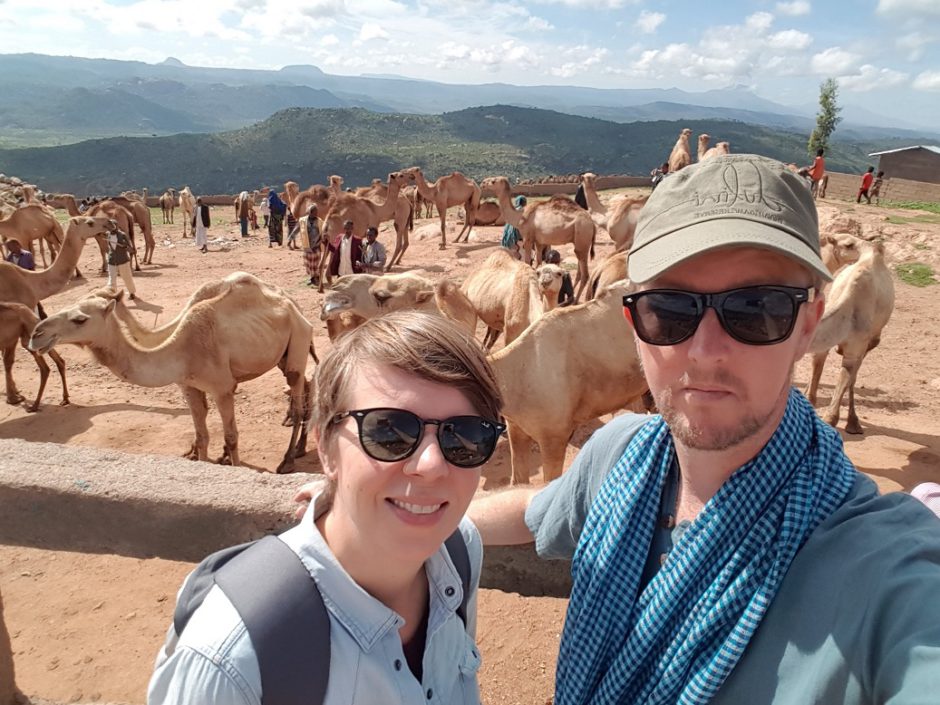Time in Ethiopia? It’s a whole other ball game. When travelling to new countries, there are always some challenges to get used to, such as the different cultures, languages, and food, to name just a few. In most cases, these are superficial, and you get used to them pretty quickly.
But what if some of these challenges are more practical and confuse your very understanding of the way the world works? Well, trying to understand time in Ethiopia did just that.

Understanding Time in Ethiopia
We all think of time as a pretty universal concept. However, most Ethiopians work off a traditional time system that can cause misunderstandings when dealing with tourists. Although, in many ways, their system is a lot more practical than ours.
Because Ethiopia is so close to the equator, there is very little difference between seasons and sunrise and sunset times. So, as sunrise is generally at around 06:00 (Western time), Ethiopians start their day then and call it 12:00. This means that, if you are used to having breakfast at 07:00 (Western Time), you’ll be having it at 01:00 Ethiopian time. It all works really well locally, but it does mean that you need to confirm if they are talking “Ethiopian Time” or “Western Time” whenever discussing a time with a local.
My wife nearly had heart failure when our waiter nonchalantly advised her that the hotel’s breakfast service ended at 04:00! After adding six hours, which is the easiest way to calculate the correct time, we realised it ended at a respectable time of 10:00. Ethiopians also have a 13-month calendar and are currently in 2014 — but that’s a whole different story!

Land Before Time
Harar is a historic town in the East of the country. Officially only established 1,014 years ago, the area was occupied by the Harla Kingdom long before that (they already had their own calendar back then).
The Christian church was established in parts of Ethiopia but the East of the country has always had strong Islamic roots and, due to persecution in Mecca, Mohammed encouraged his followers to go to Ethiopia, beginning the first hijra (migration) in Islam.
The Harari region has been occupied by travellers and rulers from the Arab Peninsula since then and between the 13th and 16th centuries, the massive 5-metre-high walls surrounding Harar were built to defend it from attack from the Ethiopian Christian empires.
This was the city’s “Golden Age” and with over 100 mosques and shrines within less than ½km², Harar became (and remains) a very important town in the Islamic world with some religious scholars considering it the 4th most holy city in Islam.
In 2006 it was declared a UNESCO World Heritage Site.
Lost In Ethiopian Time
This inner walled city is incredible. A knotted arrangement of over 350 cobbled alleys weave between the houses, many of which boast brightly coloured walls and massive ornate doors. Some of these alleys are relatively narrow, like the “friendship alley” where you need to squeeze past anyone coming in the other direction, close enough that if you weren’t friends when you entered the alley, you will be by the time you exit.

Of the many fascinating aspects of the city and its culture, including a history of coffee and weaving, and characters who lived there like the poet Arthur Rimbaud, the thing that drew me there is a unique relationship that the city’s inhabitants have with the wild hyenas in the area.
Every year at the start of the Arabic calendar, the locals hold a porridge festival where they cook vast amounts of porridge and leave it at the city’s four corners. They believe that if the hyenas come and feast, it will be a good year. If they don’t, it’s a bad omen. Historically, the hyenas also played a role in keeping the area clean and hygienic as they would dispose of organic waste dumped outside the city.
Hyena Time
The relationship between the human and hyena inhabitants of Harar has not always been harmonious, and there have been cases of hyenas attacking people and livestock. After one particularly bad drought, the hyenas began to take livestock regularly. One farmer in the area started feeding them each night to stop them attacking his cows, goats, and sheep.
He passed this habit on to his children and, to this day, some volunteers gather scraps from the local butchers and head out to the hyenas after sundown each day. This used to happen right outside one of the city gates, but recent concerns about hygiene and safety, after a number of children and rough sleepers were bitten, mean that they now feed them at a site a few hundred meters away from the city.
Dinner Time
We absolutely had to witness this natural and cultural phenomenon. So, we arranged with our guide to be taken to the feeding site on our last evening in Harar.
We clearly remember him saying he would collect us at 7:00. However, somewhere between either him or us converting the times incorrectly, in his mind he was fetching us at 8:00. As 7:00 came and went with no sign of our guide, we were getting anxious. It was likely that we would never have this opportunity again. We also had no idea how long the feeding would take!
Unable to contact our guide, or to successfully communicate with anyone around us, we headed out on our own. We flagged down a tuk-tuk driver and asked if he could take us to the feeding site. We had considered walking, but just as well we didn’t! The road there was pitch black and we knew there were hungry hyenas lurking around.
We arrived at the site just as the “hyena man” was unloading his sack of bones and meat scraps. He began whooping and calling, and slowly, the bushes around us started to rustle. Luckily our tuk-tuk driver had stayed with us as he was able to light the clearing with his headlights.
Feasting Time
A small open area was illuminated. One by one, we started to detect gleaming eyes in the darkness. Cautiously, a young hyena stepped out into the light. The hyena edged closer to the hyena man who was now sitting in the middle of the clearing.
He picked up a stick, put a piece of meat on the end and held it out for the hyena. The beast inched closer, rushed in, grabbed the meat, and hastily retreated into the darkness. Seeing that her clan member was successful, another hyena gingerly came forward for her share.
Soon all the hyenas had relaxed and started chattering and whooping around us. A few came forward, grabbed their meat, and retreated. They got brave enough quite quickly. The hyena man would guide the hyena to his back and then raise the stick above his head. The hyena then had no option but to put his massive paws on the man’s shoulders to get to the meat. The man then put the stick in his mouth and offered the meat to the hyena.

Home Time
There were occasions where a scuffle would break out between two clan members in the darkness. The shrieking and howling was quite terrifying!
The hyena man asked us if we would like to feed them. However, after having seen far too many wild hyenas in action, we politely declined. A few other witnesses did go up and have the hyenas mount their shoulders. Those bone-crushing hyena jaws (some of the strongest in the animal kingdom) mere centimetres from their heads!
The hyena man tossed limbs at some of the shyer hyenas so that everyone could have their share. We decided we better retreat before the meat ran out. Just in case there were some that didn’t quite feel full yet!
Misunderstanding Mystery Solved
Our driver took us back into the city. Halfway there, we drove past our guide who frantically waved us down. He was beside himself with anger and concern about why we never waited for him. We explained that we had waited and then had no choice but to make our own way.
We had achieved our mission, and all laughed at the situation afterwards once we realised the misunderstanding. Our guide insisted that if he was there, he would have seen to it that we fed the hyenas ourselves.
So maybe it was a good thing that he wasn’t.
Western or Ethiopian Time?
We planned to meet our guide at 08:00 the next morning. We were going for a walk around the city perimeter to buy some coffee and visit the local market before heading West and on to Dire Dawa.
Before he left us, we all confirmed the arrangements a few times: “Do you mean Ethiopian time or Western time?”

Want to Plan Your Own African Adventure?
Our Travel Experts can make your wildest African dreams come true. Contact us today to start make your trip a reality.
Read more about our African adventures here.

